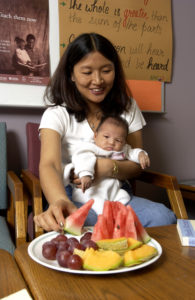Eating a variety of food from Canada’s Food Guide will help you stay healthy and meet the nutrient needs of your baby. Healthy eating will also give you the energy needed to care for yourself and your new baby. The following are some guidelines to consider while you are breast/chestfeeding your baby.
Getting to a healthy weight
Being at a healthy weight before your next pregnancy will help increase your chances of having a healthy pregnancy and a healthy baby the next time too.
Eating
While breast/chestfeeding, you will need an additional 350-400 kcal per day to meet your increased energy needs. Include additional foods from Canada’s Food Guide each day. The amount of extra food generally equals an extra snack or small meal. An example of 350-400 kcal is a slice of toast with nut butter and a glass of milk. If you aren’t able to eat enough or a variety of foods from Canada’s Food Guide speak with a registered dietitian or your healthcare provider.
Take a daily multivitamin with Folic acid (400 mcg), Vitamin D (400 IU) and Vitamin B12. If you still have prenatal multivitamins, you can use these up first.
Healthy fats (omega-3 fats from your milk) are important for your baby’s growth and development. You can increase the omega-3 fats in your milk by eating low mercury containing fish like salmon, rainbow trout, Atlantic mackerel, pollock, Artic char, herring and sardines. Smaller amounts of omega-3 fats are found in pollock (Boston bluefish), sole, canned light tuna, cod, vegetable oil, nuts and seeds, and eggs enriched with omega-3 fats. Talk to your health care provider if you do not routinely have fish in your diet.

Most foods can be eaten while you are breast/chestfeeding. However, some fish are high in mercury which can harm the developing brain and nervous system of infants and young children. While breast/chestfeeding follow similar nutrition guidelines as the section within nutrition for pregnancy.
It is normal for your baby to have gas, regardless of what you eat. If you believe your diet is causing your baby distress, speak to a healthcare professional.
If you are concerned about food allergies talk to your healthcare provider or a registered dietitian.
If you are vegan you may need other supplements. Talk to a registered dietitian about the nutrition needs of both you and your baby.
You’ll probably find that you’re more thirsty than usual. Try to drink enough fluids to keep you from feeling thirsty.
Tips for choosing drinks:
- Drink water throughout the day
- Drink milk at meals
- Limit fruit juice to 1/2 cup per day
Caffeine is found in coffee, tea, cola, energy drinks and chocolate. Limit caffeine intake to 300 mg a day or less (500 ml or 2 cups of coffee has approximately 300 mg of caffeine).
Avoid drinking alcohol while breast/chestfeeding your child(ren). Alcohol passes into your milk and then to your baby. No one knows how much alcohol a person can drink before it harms the baby. Alcohol intake can also decrease milk production. If you choose to consume alcohol during this time, talk to your healthcare provider for information about how to reduce your baby’s exposure to alcohol through your milk.
Herbal teas and herbal products pass through breast milk and some can be harmful for your baby. For more information contact your healthcare provider.
|
|